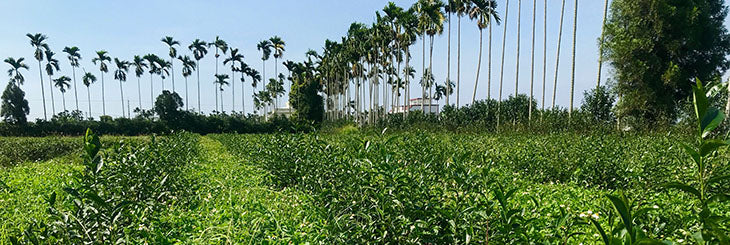
Eco-Farmed Jin Xuan GABA Tea | Eco-Cha Tea Club
Pioneering Organic Tea Farmer
Mr. Xie is hands-down the most progressive organic tea farmer we know. We've met a handful of boutique tea growers whose radically exclusive ideologies and farming methods set them apart to a degree that they are not really industry players — due to their minimal yields, non-standard produce, and exorbitant prices. Mr. Xie keeps it real. His farming methods are radical, yet practical — and he doesn't flaunt his approach. He simply does what makes sense to him, with deeply rooted convictions about natural farming. He's been at it for over 20 years, and it has been a very hard trail to blaze. He started out surrounded by conventional famers who laughed and scoffed at his approach. Now he has a small crowd of younger farmers following his model.

A Model of Sustainability
In brief, his farming approach includes no use of fertilizers or irrigation, and he also does not cut or pull the weeds that grow in his plots of tea. Rather, he lets them grow to a certain height, and then pushes them over with a hand truck. With these methods, he is slowly transitioning plot after plot of tea in a low elevation region and consequently increasing the quality and value of the tea produced. This is what we find most inspiring in terms of having a sustainable impact on the local industry! In addition to this, he has experimented and developed innovative processing methods — one of which is GABA Tea.

GABA is the abbreviated name of gamma-aminobutyric acid, which is a primary neurotransmitter in our central nervous system. It was discovered in Japan in the 1980's that by oxidizing tea leaves in an anaerobic (oxygen-free) atmosphere, this naturally occurring compound is greatly increased. GABA is now a popular health food supplement around the world that is claimed to reduce anxiety, decrease blood pressure, and have other beneficial effects.
Specialty GABA Tea
While GABA tea was invented in Japan, it wasn't until Taiwanese tea makers applied their expertise in Oolong Tea processing methods that it became known for its unique qualities of flavor along with its heath benefits. Japanese production of GABA tea is focused on its value as a health food supplement, similar to green tea powder. The tea industry here in Taiwan relies on its differentiating value of quality produce to compensate for its relatively low volume, compared to other tea producing countries. So when the demand for GABA tea increased, Taiwanese tea makers used their skillful resources and developed a specialty tea with specific healthy attributes.
Mr. Xie told us that GABA tea takes 3 days to make, following the harvest. It is basically an extensive Oolong Tea making process that involves longer solar withering following the harvest, then 8-10 hour sessions of oxidation in vacuum sealed (nitrogen atmosphere) steel cylinders, with alternating 2-3 hours of slowly tumbling the leaves in large bamboo basket cylinders. Three cycles of alternate oxidation and tumbling (about 36 hours total), followed by tumble heating (kill green), primary rolling and drying, and then a full day of rolling and drying to complete the process.
It has been cited that the GABA tea making process also raises levels of gallate esters in the composition of the leaf. Esters are compounds that provide the aromatic qualities in plants, including herbs and spices. This apparently has a lot to do with what has given Taiwanese GABA Tea its renown. It's notably fruity, like dried papaya, banana, and apricots. It has a concentrated quality to it that seems to be in accord with its extensive processing methods.
This batch of GABA tea was hand-picked from the plot of naturally grown Jin Xuan Tea plants shown above. The entire day's harvest produced a total of less than 20kg of dried tea leaves. This batch was then left to "settle" for a full year. We tasted it last year, not long after it was made and were quite impressed. But we are really glad we heeded Mr. Xie's advice that it would be even better after a year's time.
LET US KNOW!
We really want to know what you think! Leave your impressions or questions in the comment section below!
SUBSCRIBE!
If you enjoyed this post and would like to hear more about the specialty tea industry here in Taiwan, follow us on YouTube, Facebook, and Instagram and please subscribe to our newsletter. Subscribe now and get $5 off your first order!



